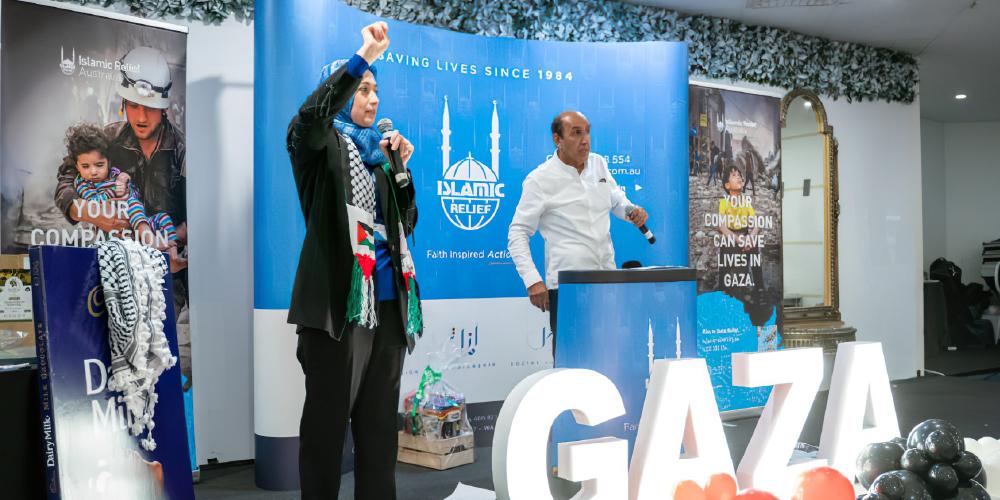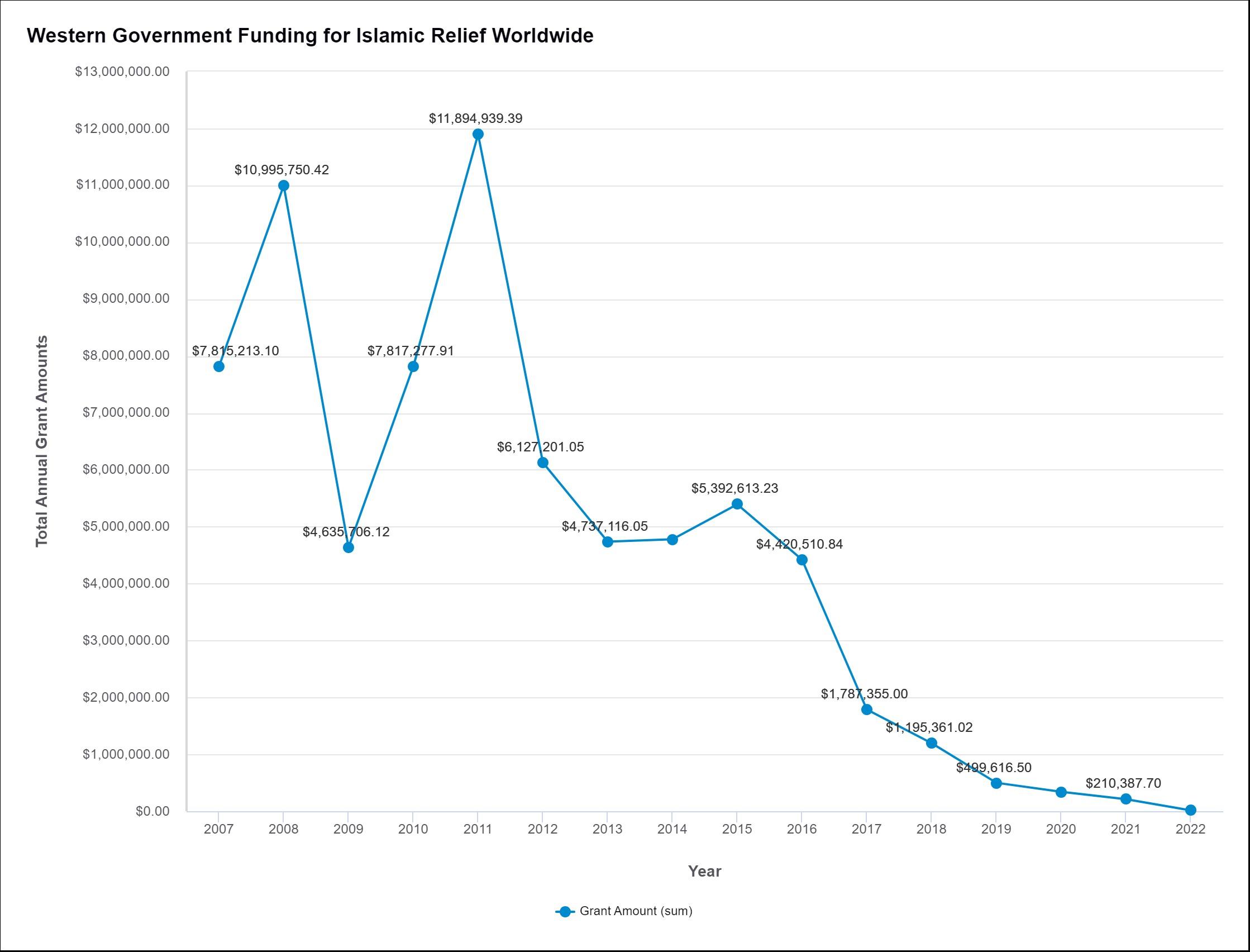The flagship institution of Islamic Relief, the wealthiest Islamist charitable franchise in the West, has largely lost the support of Western governments, its latest accounts reveal. The franchise’s income nonetheless continues to grow, however, because of its efficient fundraising efforts among Muslim communities in the United States and elsewhere, along with a steady flow of grants from the United Nations and various terror-tied extremists across the globe.
Islamic Relief Worldwide (IRW) is one of the most important Islamist financial institutions in the world, with branches, offices and affiliates in over 40 countries. Prominent members of the Muslim Brotherhood established the charity, and leading Islamist activists continue to run the franchise today.
Since the Middle East Forum and its partners, working with journalists and legislators around the world, began investigating and writing about Islamic Relief in 2014, IRW has, however, faced some difficulties.
Designated as a terrorist organization by the United Arab Emirates, and with bank accounts shut down by UBS and HSBC, the German government has determined that Islamic Relief has “significant ties” to the Muslim Brotherhood, with a Swedish government report reaching similar conclusions. British and Italian officials have investigated Islamic Relief’s hosting of radical preachers, and European media has extensively covered numerous examples of antisemitism and pro-terror rhetoric among top IRW officials.
Both the Egyptian and Tunisian governments have accused Islamic Relief of financing jihadists. And a document put out by the Iraqi government, citing terrorism allegations, appeared to ban the “Islamic Relief Organization across the world.”
In 2020, the U.S. State Department warned about the “blatant and horrifying anti-Semitism and glorification of violence exhibited at the most senior levels of Islamic Relief Worldwide.” The Netherlands also subsequently cut ties.
IRW accounts now reveal that funding from Western governments has declined significantly as a result of this scrutiny. While figures do not include funding to Islamic Relief’s branches around the world, Western government financial support for IRW itself has markedly decreased, year-on-year, from almost $12 million in 2011, to a paltry $15,000 in 2022.
However, this is not yet a crisis for the Islamist franchise – for a start, Islamic Relief does not face a revenue problem. In fact, its 2022 accounts report an enormous $286 million of income. Meanwhile, increased funding from the United Nations has more than offset the loss of Western government support, with over $23 million given in 2022 by just one UN initiative to IRW.
Branches of Islamic Relief around the world are increasingly productive fundraisers for IRW, sending almost $180 million to the franchise headquarters in 2022. The most successful was Islamic Relief’s branch in the United States, which gave IRW over $80 million that year.
Notwithstanding, for charities such as Islamic Relief, and for international Islamist charities everywhere, Western government backing is extremely important, and the loss of these partnerships is significant.
For a start, government backing serves to legitimize Islamists as representative voices of Western Islam, which in turn helps Islamists impose control over Muslim communities in the West.
Western support also gives Islamist charities a degree of freedom from scrutiny and suspicion in the eyes of international media, law enforcement and non-Western governments. It is only in the past few years, for instance, that the governments of countries such as India have begun to investigate the role that Western Islamist charities have played in radicalizing Indian Muslim youth, despite these charities having operated in the country for decades.
Western government support also opens up additional funding possibilities for Islamists, such as involvement in international charitable umbrella efforts; and also affords access to high level diplomatic contacts and opportunities.
It is for these reasons that other Islamist actors in the East have moved millions of dollars through the bank accounts of charities such as Islamic Relief. Western Islamist charities, sanitized by Western government backing, offer a clean means for Islamists of all stripes to finance radical causes.
In just the past few years, for instance, IRW’s accounts show over $360,000 of donations from the Sheikh Abdullah Al-Nouri Charity, a prominent Muslim Brotherhood charity in Kuwait, which U.S. government hearings and Kurdish media outlets have accused of working to eradicate the Yazidi presence in Iraq. Over the past decade, meanwhile, the International Islamic Charitable Organisation, an Islamist charity accused of funding the terrorist group Hamas, has handed millions of dollars to IRW. The Qatar Charity, a key arm of the Qatari regime which previously funded Bin Laden and Al Qaeda, handed IRW over $600,000 in 2020. And the Islamic Development Bank, which once pledged over $500 million to support the Palestinian “resistance” and the families of suicide bombers, gave IRW almost $500,000 in 2022.
Nonetheless, the amounts laundered through IRW’s coffers by other Islamists around the world are now significantly less than they were a decade ago, likely because of the sharp decrease in Western government support for IRW.
Between most of the years between 2004 and 2014, for instance, IRW’s accounts revealed at least $5 million of income every year from dozens of other radical institutions, including branches of the Muslim Brotherhood in the Gulf, terror-connected groups such as the Charitable Society for Social Welfare, which was founded by the Al-Qaeda terrorist and Bin Laden loyalist Abdul Majeed Al-Zindani.
In other words, Western government support for a domestic Islamist charity in Britain serves to meddle with the politics of Islam all across the globe, to the benefit of Islamists. And so in spite of increased revenue across the board, the loss of this Western support has dealt a major blow to the Islamic Relief franchise.
Islamic Relief branches have attempted to fight back, with one branch reportedly spending $100,000 on efforts to hide Google search results showing the Middle East Forum’s investigations of its extremism. At the same time, however, the Islamic Relief franchise remains as closely involved with terror-tied entities as ever, funding organizations in Gaza such as a Hamas-run charity named the Unlimited Friends Association.
Stronger measures are still required. Indeed, that IRW appears to have lost explicit government backing is welcome, but, vitally, the franchise still benefits enormously from the taxpayers’ largesse through other untracked means. In the United Kingdom, for instance, government donor match schemes and tax relief efforts such as “Gift Aid” end up further subsidizing Islamic Relief’s efforts to the tune of millions of pounds each year, although exact amounts are difficult to confirm.
As multiple official inquiries have uncovered, Islamic Relief is also far from the only Islamist charity that receives government funding. If Western governments are serious about tackling the influence of international Islamism and its financial institutions, then these Islamist organizations should simply be shut down. They are public charities, and operate at all our expense.
Sam Westrop is director of Islamist Watch, a project of the Middle East Forum.

